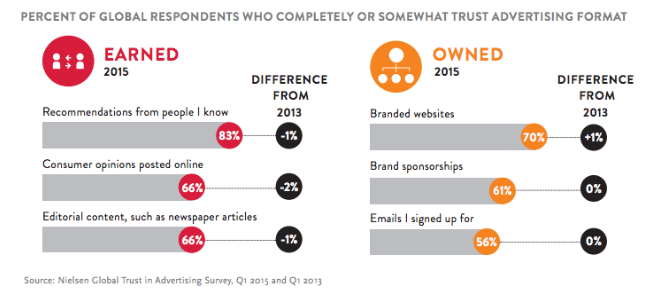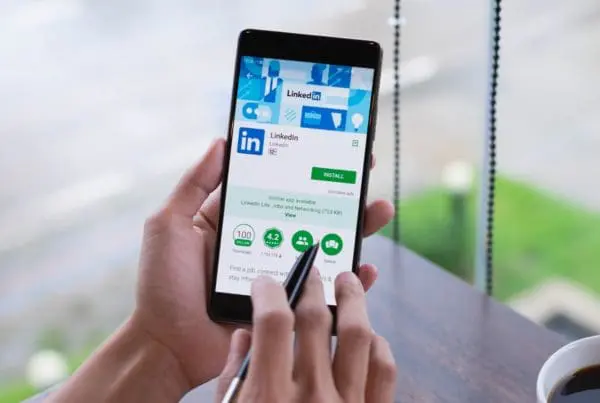We all want to build trust with our customers and potential customers, right? I can’t think of a business I’ve ever worked with that didn’t say something to the effect of, “We don’t want to just be a vendor, we want to be a trusted advisor.” Of course you do. We all do.
So how do you build trust? According to media measurement giant Nielsen, the most trusted source of information–by far in most parts of the world–is “recommendations from people I know.” (83%)

Recommendations from acquaintances falls into the category of “earned” trust, as opposed to “owned,” which is your own promotional content and paid advertising. Second among trusted sources businesses must earn are “consumer opinions posted online,” (66%) tied with “editorial content such as newspaper articles,” (66%).
In short, people tend to trust what other people say about you rather than what you say about yourself.
When it comes to owned sources–paid advertising and promotion–the most trusted source of information is “branded websites,” (70%). This is good news for corporate marketers. The second most trusted source of information is “brand sponsorships,” (61%) followed by “email I signed up for,” (56%).
Note the steep drop off of just about everything other than recommendations from known sources.
We all value the recommendations of people we know because we believe they are unbiased and are genuinely trying to help us. There are ways to create this experience online with testimonials and reviews–that gets us the recommendations but usually lacks the “people I know” component unless your business is very locally focused. Near the bottom of the list, also a surprise given the amount of money doled out in the form of ads and sponsorships, is “athlete endorsements.” Buying recommendations doesn’t seem to work.
One of the challenges marketers face is that we tend to confuse engagement with trust. We want to see that we have a lot of traffic, a lot of followers, a lot of email opens. According to Moz blogger Ronell Smith, “Engagement is a goal; it shouldn’t be the goal. First, engagement simply means people noticed your content and interacted with it in some, typically small, way. That could mean a social share, leaving a comment, sharing a link, etc.”
“If engagement is a blind date, trust is going steady. It has to be in place before things get too serious,” says Smith. “In the strictest sense, trust is about how prospects and customers view your brand, how they view the people who represent your brand, what you stand for, and how you make them feel.”
How do you build trust? It’s pretty simple, according to Smith. It’s all about honesty. For example, how many of you have ever given credit to other companies?
“In addition to writing posts and sharing your brand’s content,” Smith says, “you should also be sharing valuable content from other non-competing brands; engaging in meaningful online conversations surround your vertical; interviewing influencers in your space; and creating a presence that moves seamlessly between online and offline, social and content, human to human.”
The goal is really to recreate the experience of trust from known sources using unknown sources. Feature content on your and off that mirrors your target audience’s needs and desires–that they identify with and think, “that’s me.”
Smith says, “The fact of the matter, though, is that people respond best to people. Not words or images or fancy design. And as reluctant as you might be to have public faces for your brand, you need it to make your content marketing efforts work.”




